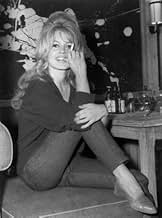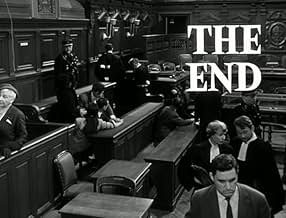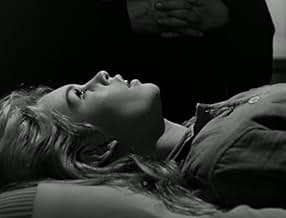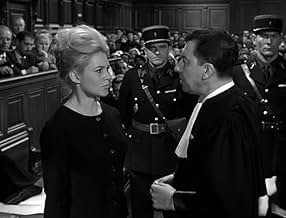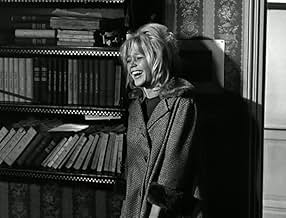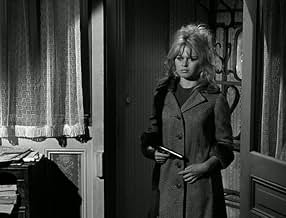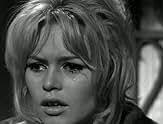La vérité
- 1960
- Tous publics
- 2h 10m
IMDb RATING
7.6/10
4.9K
YOUR RATING
A liberated small-town girl stands on trial to determine whether she killed her lover in a crime of passion or in premeditation.A liberated small-town girl stands on trial to determine whether she killed her lover in a crime of passion or in premeditation.A liberated small-town girl stands on trial to determine whether she killed her lover in a crime of passion or in premeditation.
- Nominated for 1 Oscar
- 3 wins & 2 nominations total
Barbara Sommers
- Daisy
- (as Barbara Sohmers)
Featured reviews
If "Rashomon" blew your mind, "La vérité" will blow your heart. In 1950, Japanese director Akira Kurosawa blew our minds with his unforgettable "Rashomon", a murder mystery that exposed the chimerical nature of truth as it is perverted by the flawed perception of each observer. We visualized the events surrounding a murder, via the conflicting testimonies of witnesses in court, never being told what's truth and what is not. Here in 1960 French director Henri-Georges Clouzot hits us with "La vérité", a murder mystery similarly visualized via testimonies in a courtroom drama, but in this case the facts are not disputed. In this case what's being subjectively perverted is the emotion behind the crime.
Brigitte Bardot is a young girl on trial for the murder of her lover. The prosecution perceives her as a cold-hearted, calculating killer. The defense sees her as a heartbroken, confused young girl pushed to a desperate act. What we get is a suspenseful peeling of the truth, but not the truth in terms of facts. We get to the root of the truth in terms of feelings. I imagine if you were to hook electrodes to your brain and study which areas light up when watching these films, "Rashomon" would light up your frontal lobe (logic center) while "La vérité" would light up that tiny peanut at the core of your head, the amygdala (emotional center).
The point being made, and unforgettably expressed in a passionate monologue by Ms. Bardot, is that hard facts aren't the only component of truth. She roars: "You sit up there, in your ridiculous robes, and you want to judge but you have never lived! Never loved! You hate me because you are dead! Dead!"
I challenge anyone to watch that scene and tell me that Brigitte Bardot isn't one of the finest actors. Even at the young age of 25, thrust into an intimidating arena alongside theatrically trained, veterand actors and one of the most notoriously perfectionist directors of cinema, she really carries the show. The role had originally been written for respected actor Sophia Loren, but Clouzot rewrote the entire story for Bardot after she was cast. Indeed she seemed to be made for this role and vice versa; the role was written for her (literally). In interviews Bardot stated that with no formal acting training she had to rely on convincing herself that she actually was the character Dominique. And this itself leads to a bizarre case of life imitating art (or the other way around?) where, feeling judged and persecuted by the press, Brigitte had a severe breakdown and shocking incident on her birthday in 1960 just weeks before the film's release. Google it after you watch the movie. Funny how even the press's & haters' reaction to the incident mirrored the prosecution's reaction to similar incidents in the tale of Dominique.
This film is a landmark with regard to emotional storytelling. And it's a landmark with regard to our human experience, attempting to understand this misshapen thing called reality. If you learned something from "Rashomon" then don't consider your education complete until you watch this essential companion film.
Brigitte Bardot is a young girl on trial for the murder of her lover. The prosecution perceives her as a cold-hearted, calculating killer. The defense sees her as a heartbroken, confused young girl pushed to a desperate act. What we get is a suspenseful peeling of the truth, but not the truth in terms of facts. We get to the root of the truth in terms of feelings. I imagine if you were to hook electrodes to your brain and study which areas light up when watching these films, "Rashomon" would light up your frontal lobe (logic center) while "La vérité" would light up that tiny peanut at the core of your head, the amygdala (emotional center).
The point being made, and unforgettably expressed in a passionate monologue by Ms. Bardot, is that hard facts aren't the only component of truth. She roars: "You sit up there, in your ridiculous robes, and you want to judge but you have never lived! Never loved! You hate me because you are dead! Dead!"
I challenge anyone to watch that scene and tell me that Brigitte Bardot isn't one of the finest actors. Even at the young age of 25, thrust into an intimidating arena alongside theatrically trained, veterand actors and one of the most notoriously perfectionist directors of cinema, she really carries the show. The role had originally been written for respected actor Sophia Loren, but Clouzot rewrote the entire story for Bardot after she was cast. Indeed she seemed to be made for this role and vice versa; the role was written for her (literally). In interviews Bardot stated that with no formal acting training she had to rely on convincing herself that she actually was the character Dominique. And this itself leads to a bizarre case of life imitating art (or the other way around?) where, feeling judged and persecuted by the press, Brigitte had a severe breakdown and shocking incident on her birthday in 1960 just weeks before the film's release. Google it after you watch the movie. Funny how even the press's & haters' reaction to the incident mirrored the prosecution's reaction to similar incidents in the tale of Dominique.
This film is a landmark with regard to emotional storytelling. And it's a landmark with regard to our human experience, attempting to understand this misshapen thing called reality. If you learned something from "Rashomon" then don't consider your education complete until you watch this essential companion film.
Here Brigitte Bardot strips bare and the precedent writer was completely right;it's not Dominique who's judged ,but Bardot herself.Never a character had been closer to the actress -I'm obviously speaking of the public figure- than this victim.Because she's primarily a victim : of a family who was dreaming of a good girl,respectful of family values -see Marie -José Nat 's Annie ,the perfect sister ,the "good" ,the earnest musician :she's so "straight"so "holier-than-thou,that she's almost frightening-;of a society ,not prepared to accept this new way of life,which predates the events of MAY 1968 and woman's lib;and finally,and mainly ,of men:they,too, are not prepared to accept the fact that a woman wants to live like .. a man:Samy Frey,the well-respected and well-meaning young man is actually a macho as well as a future mean bourgeois.
The man who worked this miracle ( turning Bardot into a first -class thespian) is none other than Henri-Georges Clouzot,one of the most daring clever gifted directors France has ever known.It was probably a hard time for him:he was about to become ill ,and that would prevent him from making another movie before 1968 ("the prisoner" ,his final achievement);besides the nouvelle vague on the rise dismissed Clouzot as a man of of the past,one of those creeps who "did not live what he was filming" (sic).Clouzot ,at his best, was better than 10 Chabrol ,20 Truffaut and 100 Godard ,but there's no accounting for tastes.Suffice to say that Clouzot,during his relatively short career (20 years ,and 11 films) ,took more chances single-handedly than the three artists mentioned above ,and his best works ("l'assassin habite au 21","le corbeau","quai des orfèvres","Manon","les diaboliques" -which got more praise abroad than in its native country- and "wages of fear" )are all classics.
"la vérité" is a long flashback ,a giant jig-saw the pieces of which will not completely put together at the end.The lovers of "les diaboliques" will appreciate the duel Paul Meurisse /Charles Vanel.They say HG Clouzot was very hard on his actors:but what a filmography!
In her memoirs ,BB wrote that it was HER favorite movie.
The man who worked this miracle ( turning Bardot into a first -class thespian) is none other than Henri-Georges Clouzot,one of the most daring clever gifted directors France has ever known.It was probably a hard time for him:he was about to become ill ,and that would prevent him from making another movie before 1968 ("the prisoner" ,his final achievement);besides the nouvelle vague on the rise dismissed Clouzot as a man of of the past,one of those creeps who "did not live what he was filming" (sic).Clouzot ,at his best, was better than 10 Chabrol ,20 Truffaut and 100 Godard ,but there's no accounting for tastes.Suffice to say that Clouzot,during his relatively short career (20 years ,and 11 films) ,took more chances single-handedly than the three artists mentioned above ,and his best works ("l'assassin habite au 21","le corbeau","quai des orfèvres","Manon","les diaboliques" -which got more praise abroad than in its native country- and "wages of fear" )are all classics.
"la vérité" is a long flashback ,a giant jig-saw the pieces of which will not completely put together at the end.The lovers of "les diaboliques" will appreciate the duel Paul Meurisse /Charles Vanel.They say HG Clouzot was very hard on his actors:but what a filmography!
In her memoirs ,BB wrote that it was HER favorite movie.
This comes as a surprise entry in Brigitte Bardots filmography. Surely the blonde siren wasn't everybody's first chance for a female lead in a Henri-Georges Clouzot film; then again, the role she is playing fits perfectly. Dominique Marceau is a pretty young girl eager to leave her parents home and live with her sister in Paris. Other than her, Dominique is living out her lust for life, hanging around with friends, with parties, drinking and casual affairs. By coincidence she encounters her sisters fiancée, a very serious young musician. Eventually they fall in love, but Dominique can't be faithful and Gilbert (Sami Freys character) cannot adjust to her way of life. They break up, reunite, and break up again with Gilbert more and more being ridiculed by her affairs with other men. On the other hand, Dominique cannot let him go either, and when he suddenly loses all his passion and returns to her sister, Dominique makes a decision. This is all told in flashback sequences during the trial in which Dominique is accused of Gilberts murder. The people participated in finding the truth, Clouzot tells us, are incapable of leaving their personal convictions and moral perspectives out of the court. Whatever the verdict may be, Dominique won't leave as an innocent. - "La Verité" has some memorable scenes, not least the one where Gilbert is conducting Strawinskys "Oiseau de Feu" on television, which blends over to the next scene while the music continues without a break. While being a serious drama about passion and justice, Clouzots film still makes good use of Bardots erotic energy and yet there is never a moment where the images make the story irrelevant.
Through contemporary eyes, you might be quite surprised, what most of the courtroom did surmise, without any question or compromise, but the flashbacks tell no lies and the romance, sadly, 'meurts'.
Far from the best of Clouzot and consequently not much revived but of considerable interest nevertheless for giving Bardot her best part. She plays a young woman on trial for murdering her lover and it alternates between the trial itself and the events leading up to the killing. It's got an outstanding cast, (Charles Vanel and Paul Meurisse are excellent as opposing lawyers and Bardot herself is terrific), and yet it often feels rather common-place, (Clouzot, his wife Vera and 4 others are credited with the screenplay; maybe a case of too many cooks?). For once, he doesn't build any suspense and you never really care what happens to Bardot. In the end it's the personality of the victim, (a first-rate Sami Frey), that proves to be the film's point of interest, though at 130 minutes it is something of a long haul.
Did you know
- TriviaDirector Henri George Clouzot pushed his actors and actresses so hard - Sami Frey and Jacques Perrin were about to hit him in the face - that Brigitte Bardot tried to commit suicide after the shooting. She was too much implicated, involved in the Dominique character. She also said that this movie was the only one in her career which she was really proud of.
- Quotes
The Prosecuting Attorney: You spent weeks seducing him, didn't you? Weeks!
Dominique's Attorney: Objection! What length of time should she have spent? Is there any legal limit on how long a seduction ought to take?
- ConnectionsFeatured in The Art of Arts TV: The Single Arts Film (2008)
- SoundtracksL'Oiseau de Feu
Written by Igor Stravinsky
- How long is The Truth?Powered by Alexa
Details
- Release date
- Countries of origin
- Language
- Also known as
- The Truth
- Filming locations
- Rue Saint-Antoine, Paris 4, Paris, France(Dominique hit by a bus)
- Production companies
- See more company credits at IMDbPro
- Runtime2 hours 10 minutes
- Color
- Aspect ratio
- 1.66 : 1
Contribute to this page
Suggest an edit or add missing content


